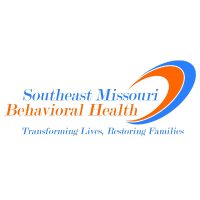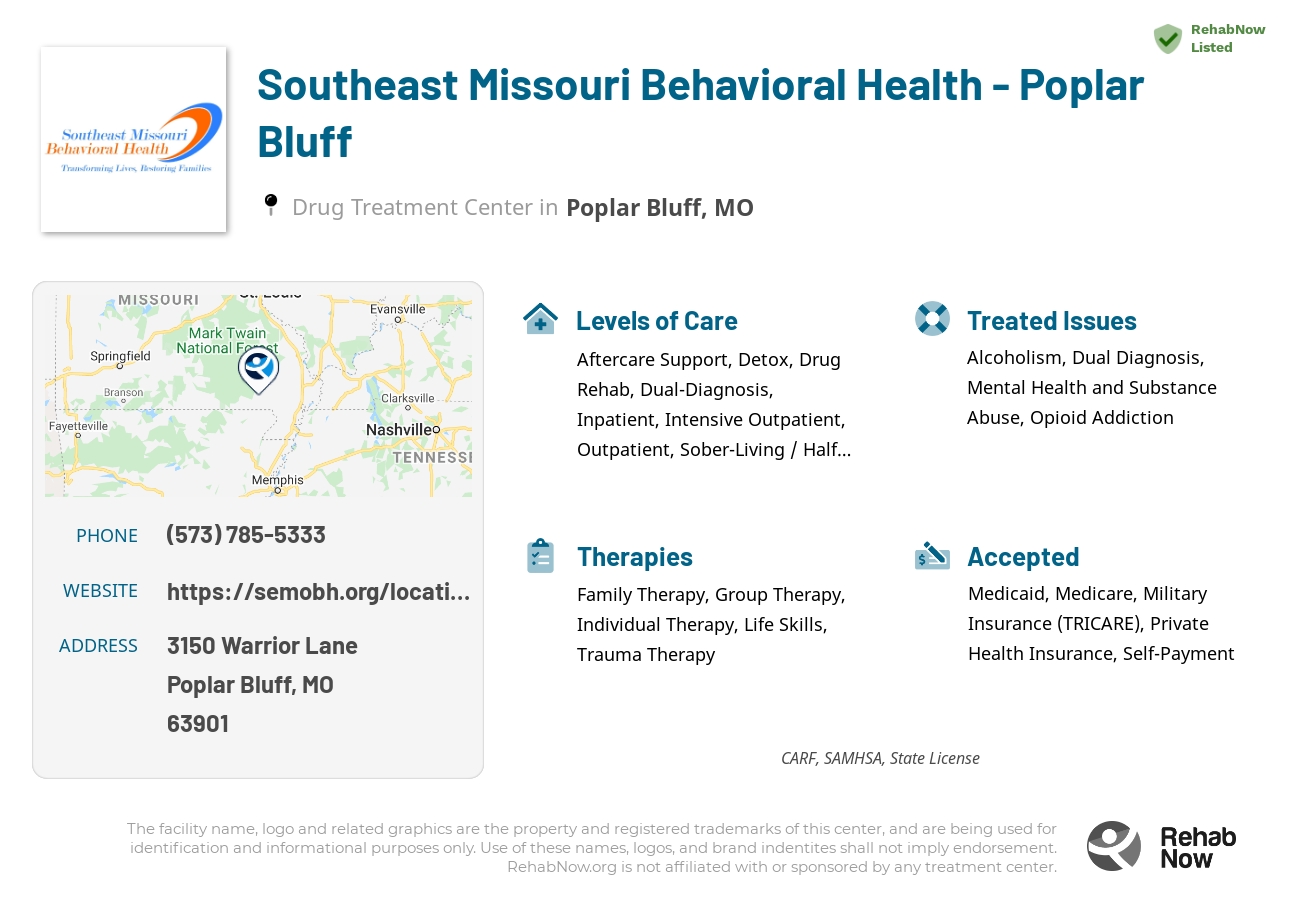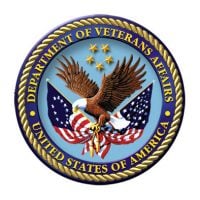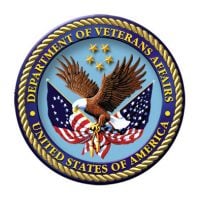Southeast Missouri Behavioral Health - Poplar Bluff
Drug Rehab Center in Poplar Bluff, Missouri
Southeast Missouri Behavioral Health - Poplar Bluff provides comprehensive mental health and substance abuse treatment services with individualized treatment plans, licensed professionals, evidence-based therapies, specialized services, family and group therapy, and accreditation from CARF and the Missouri Division of Mental Health.
About Southeast Missouri Behavioral Health - Poplar Bluff in Missouri
Southeast Missouri Behavioral Health - Poplar Bluff (SMBH-PB) is a comprehensive mental health and substance abuse treatment facility located in Poplar Bluff, Missouri. The mental health and substance abuse treatment services at SMBH-PB are designed to meet the unique needs of each individual patient. The facility is licensed, accredited and provides a wide range of specialized services, including outpatient therapy, detoxification services, psychiatric care, and residential treatment.
At SMBH-PB, clients receive evidence-based treatment for addiction and substance abuse using a supportive, individualized approach. Their team of highly trained and experienced professionals is committed to providing quality, compassionate care. To meet the needs of each patient, SMBH-PB offers individualized treatment plans which combine evidence-based therapies, medications and lifestyle modifications. In addition, SMBH-PB offers family and group therapy and provides educational and emotional support for clients and families.
SMBH-PB is accredited by the Commission on Accreditation of Rehabilitation Facilities (CARF) and is part of the National Network of Addiction Treatment Providers. Their staff consists of licensed therapists, nurses, psychiatrists, social workers, and mental health counselors who specialize in the treatment of addiction and substance abuse. They also offer a variety of specialized services such as evidence-based interventions, peer support, and trauma-informed care. SMBH-PB is proud to have been named one of the Best Drug and Alcohol Rehab Facilities in Missouri and has also been recognized by the Missouri Division of Mental Health for its commitment to excellence in providing quality care.
Genders
Ages
Modality
Additional
Accreditations
State License
SAMHSA

CARF
The Commission on Accreditation of Rehabilitation Facilities (CARF) is a non-profit organization that specifically accredits rehab organizations. Founded in 1966, CARF's, mission is to help service providers like rehab facilities maintain high standards of care.
Conditions and Issues Treated
Many people who struggle with opioid addiction need to attend specific programs like methadone , Suboxone or Vivitrol clinics.
These types of programs will provide the patient with legal, prescription medications that can help them overcome their cravings for illegal opioids like heroin or fentanyl . If the patient has a chronic condition like Hepatitis C, they must undergo treatment before they can begin taking these medications.
Dual Diagnosis is a specific relationship between two or more disorders that have the same symptoms and can sometimes be treated together. This is used in the treatment planning process when dealing with drug addicts. Dual diagnosis can be viewed as a chronic medical condition that has comorbid psychiatric disorders.
Although addiction and a mental illness may have separate symptoms that are not easy to detect, they often go hand in hand. Many times, drug abuse is a direct result of the mental illness. In other words, treating the addiction will not resolve all of your issues. Unless you also treat the underlying mental illness, you will not be successful in achieving sobriety.
Levels of Care Offered
This center offers a variety of custom treatment tailored to individual recovery. Currently available are Aftercare Support, Detox, Drug Rehab, Dual-Diagnosis, Inpatient, Intensive Outpatient, Outpatient, Residential, Sober-Living / Half-Way, with additional therapies available as listed below.
Detox refers to the progressive elimination from the body of toxins. The detox period depends on the form of addiction, the length of drug abuse, and the state of health. Under the supervision of medical practitioners, MAT detox based in Poplar Bluff, MO requires the use of medications.
Inpatient treatment is an intensive program that takes place when a patient checks into a rehabilitation facility. The treatment includes detoxification and counseling sessions, which are round the clock. Outpatient treatments are also available, but inpatient care is advised as the first step of rehabilitation.
Intensive rehab ensures the patient stays in a substance-free atmosphere, improving treatment success rates. The patient participates in group therapy for motivation from other patients who have overcome addiction. Family members are also involved in providing emotional support throughout the program.
An intensive outpatient program is usually the first phase of addiction treatment. It provides relief for those who are addicted, but are not ready to commit to an inpatient setting. Typically, the patient lives at home and is able to work or go to school. IOPs consist of a daily 3 to 5-hour program, and there is a required number of hours per week. Most patients go to IOP between 20 and 40 hours per week. The patient attends group counseling and individual therapy throughout the duration of treatment. They also meet daily with their therapist to discuss how it’s going and where they are in the recovery process.
The goal here is to teach patients healthy coping skills, such as stress management and identifying thoughts and behaviors that lead to relapse. The implementation of these skills will be useful as the individual transitions into the next phases of treatment.
An outpatient treatment program is set up to help with alcohol or drug addiction, or a co-occurring disorder. The patient must attend the Missouri facility for their therapy and other programs but are able to return home each night. The frequency of mandatory attendance decreases after much of Southeast Missouri Behavioral Health - Poplar Bluff‘s program is complete.
Sober Living Homes are an option for those who have completed a treatment program within the past several months. However, it isn’t advisable to use this as a permanent living arrangement because it can lead to a relapse .
The goal of a sober living home is to provide a supportive environment for recovering addicts so they don’t need to return to their previous lifestyles. The homes will not accept residents who are still using drugs or alcohol, and those living in the house must follow a set of rules dictating how they should behave to avoid relapsing.
Residential treatment programs are those that offer housing and meals in addition to substance abuse treatment. Rehab facilities that offer residential treatment allow patients to focus solely on recovery, in an environment totally separate from their lives. Some rehab centers specialize in short-term residential treatment (a few days to a week or two), while others solely provide treatment on a long-term basis (several weeks to months). Some offer both, and tailor treatment to the patient’s individual requirements.
Aftercare is a term that’s used to refer to any sort of continuing care offered for a drug addict who has voluntarily entered a rehabilitation program. This type of care can be provided in several settings, including outpatient therapy sessions after the addict has completed an inpatient program. There are also 12-step support groups, such as Alcoholics Anonymous, which can provide additional help for addicts trying to stay sober.
Therapies & Programs
Individual Therapy is a critical component of addiction recovery. Therapists work with patients to identify the root of their addiction and figure out how to better handle the issues that led to them using drugs. Individual Therapy is the one-on-one session where people meet with their therapist. Individual therapy provides a safe space for people to open up and discuss personal and sensitive topics which they may not feel comfortable discussing in a group setting.
Family therapy will also help families realize that the addiction is not their fault. For many years, people blamed themselves for an addict’s behavior and felt that they had done something wrong. This is not the case. Addiction is a disease, and it can strike anyone, even if their life seems fine from the outside. It can bring a lot of shame to a family when they have an addict in their midst, but if everyone is open and honest with each other, then they can help everyone stay in recovery.
Group Therapy is utilized by drug treatment centers like Southeast Missouri Behavioral Health - Poplar Bluff to provide the recovering drug addict with a platform to talk about their feelings and experiences. It also provides for an opportunity to learn from other addicts who have successfully overcome their addiction.
Group Therapy is employed in lectures, seminars, or discussion groups (the latter two are typically conducted as “therapy groups”). It is recommended that all group members be recovering addicts for this type of therapy to work (though it does not exclude others with lived experience).
Trauma therapy is a clinical process that helps individuals deal with mental stress often caused by traumatic events. It is generally done for children, teenage victims of sexual assault, and war veterans. The therapist helps the person identify, understand and work through the problem. This is done with the help of talking about it in group or one-on-one counseling sessions. Therapists use relaxation, role-playing, art, and music to help the person open up about what is bothering them.
Training in improved life skills helps those recovering from addiction feel more capable of self-care. Southeast Missouri Behavioral Health - Poplar Bluff are daily skills that give the person the tools they need to survive.
The therapy covers practical activities like cooking, job hunting, social interaction, and money management, helping to fill in the knowledge gaps caused by addiction.
These life skills help the person self-manage their recovery and stay on track. It also reduces relapse risk as they gain confidence in their day-to-day abilities.
Payment Options Accepted
For specific insurance or payment methods please contact us.
Is your insurance accepted?
Ask an expert, call (888) 674-0062
Southeast Missouri Behavioral Health Associated Centers
Discover treatment facilities under the same provider.
- Southeast Missouri Behavioral Health - South Main Street in Poplar Bluff, MO
- Southeast Missouri Behavioral Health Salem Center in Salem, MO
- Southeast Missouri Behavioral Health - Aquinas Center in Farmington, MO
- Southeast Missouri Behavioral Health - Dexter in Dexter, MO
- Southeast Missouri Behavioral Health - Rolla in Rolla, MO
Learn More About Southeast Missouri Behavioral Health Centers
Additional Details
Specifics, location, and helpful extra information.
Poplar Bluff, Missouri 63901 Phone Number(573) 785-5333 Meta DetailsUpdated November 25, 2023
Staff Verified
Southeast Missouri Behavioral Health - Poplar Bluff Patient Reviews
There are no reviews yet. Be the first one to write one.
Poplar Bluff, Missouri Addiction Information
Opioid-related overdoses in Missouri have been increasing steadily for the past three decades. In 2018, more than 1,130 people in Missouri died from opioid abuse. Methamphetamines and marijuana abuse have surpassed opioid abuse in Missouri. Missouri is the number 1 methamphetamine manufacturer in the country with more than 27 meth labs per 100,000 people.
According to recent statistics, approximately 3,000 people in Poplar Bluff struggle with drug addiction, and only about 10% of them will receive any form of treatment. In recent years, there has been an increase in the abuse of prescription drugs, such as painkillers and tranquilizers. Drug treatment in Poplar Bluff can vary depending on the facility. Most rehab centers will offer various treatment options such as detoxification, counseling, and aftercare services.
Treatment in Nearby Cities
- Waynesville, MO (123.2 mi.)
- Aurora, MO (182.1 mi.)
- Sunrise Beach, MO (163.0 mi.)
- Nevada, MO (228.6 mi.)
- Sainte Genevieve, MO (89.2 mi.)
Centers near Southeast Missouri Behavioral Health - Poplar Bluff
The facility name, logo and brand are the property and registered trademarks of Southeast Missouri Behavioral Health - Poplar Bluff, and are being used for identification and informational purposes only. Use of these names, logos and brands shall not imply endorsement. RehabNow.org is not affiliated with or sponsored by Southeast Missouri Behavioral Health - Poplar Bluff.











